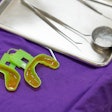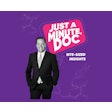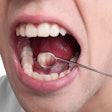
For three weeks, I went without sugar, grains, and dairy. I wanted to give my gut a good cleanse and see if I could figure out any real digestive disruptors.
I come from a long line of those with digestive stress. My grandmother had a morning ritual of All-Bran cereal and prune juice. I swore I would never be like that. My dad suffered with unknown causes of stomach pains and occasional ulcers. And, then, I dealt with acid reflux and bloating.
 Lisa Knowles, DDS.
Lisa Knowles, DDS.Along the way, I learned about the role of stress and its association with digestive problems. Our bodies tell our digestive systems to shut down when under stress. After all, it's our big leg and arm muscles that need the energy to run away in a fight or flight situation -- not our stomachs or intestines. Amid the realization that stress may indeed play a big part in my family's digestive issues, I also realized I had picked up another family habit on my mom's side: dealing with stress by eating sugar.
So from one side of my family, I learned to worry and stress about many things, and from the other side, I learned to cope with my stress by eating sugar. My mom baked her way through a lot of difficulties. She taught me how to feel better with cookies and milk, and, even more troublesome, she taught me to help others with their problems by giving them baked goods and get-well gifts like chocolate and candy.
Feelings sad? Here is some chocolate. Feeling disappointed? Let me give you brownies. Lose your game? Let's go get ice cream to cheer you up.
The culture I grew up in is not very different from many of my friends' families. These familial habits are the ones killing our families, though. Instead of helping our children learn to cope with their stress or anxiety with mental strategies, we are inadvertently hindering their overall health. Plenty of obesity and diabetes charts show the progress of these disabling diseases in our Western culture -- and now also in other parts of the world as they assume our unhealthy habits.
As a healthcare professional, I want to scream out to the world, "Don't do it. Don't adopt our Western diet. Don't change your work schedules to work 24/7 like we do." But, I don't think they will listen. The marketing is too good, the lure is too tempting, and the sugar is too addictive. No, we are going to have to show the world how to correct these societal flaws -- flaws that are costing us enormous costs in healthcare dollars and in American lives. But how?
Glowing smile
My patient from a few weeks ago gave me an idea. I stared at his shackled feet and hands and wondered how he became incarcerated. He had the same white tennis shoes as everyone else in his situation, except I noticed his initials on the back heel of each shoe. At 17, he was about to be released, and he came through our clinic for a final, mandated six-month oral exam. He had a beautiful smile. He had a white, cavity-free smile that glowed.
Amazed at this phenomenon, I mustered up the courage to ask him about his low decay rate. "No cavities again," I told him. "What's your secret?"
He looked at me with a big, smart-ass type grin and said, "Get locked up. I have been in since I was 13." All in the room laughed. The juvenile security prison allows very little sugar, and there are no frills like soda or candy. The options are limited with no freedom to choose.
I wished my patient the best and reminded him to keep his diet low in sugar to keep his beautiful smile -- even when he has the option to eat and drink anything he wants.
My thoughts return to him quite often. I knew that someone cared about him up until age 13, because he did not have a mouth full of decay that I often see as early as age 2 or 3. Someone probably took him to the dentist, and someone helped watch out for his health.
I think so often of what that person felt like when she or he watched him be taken away -- and when she realized he made such a big mistake. I thought about my own child being sent away from me at the age of 13. No hugs at night. No smiles in the morning for five years.
Every time that I think it's hard to deny my kids the sugar they beg for or the sweets they tell me everyone else has, I think of the young man with the white tennis shoes. I remember that it's not that hard to say no. I remember that we don't have to be incarcerated to stop ourselves from eating too much sugar. My patient made a bad choice and that led to a life of no choices for five years.
Drawing the line
And, every time I struggle with worry, as a professional, about where to draw the line with my nutritional counseling and health recommendations for my patients, I think about the ultimate consequences of a poor diet: diabetes, obesity, heart disease, cancer, and, of course, tooth loss. These are diseases that take choices away from people. It may be that they cannot chew well, or it may be that they cannot live the way they want to or for as long as they had hoped. In some ways, it is like being imprisoned.
“Cavities certainly give us a great way to start talking to patients or their parents about nutrition, dietary concerns, and self-care.”
Our patients' teeth are great indicators of overall health. Their teeth are not foolproof, of course. Not every disease or poor diet habit shows up in the mouth, but given enough time, many do. And, cavities certainly give us a great way to start talking to patients or their parents about nutrition, dietary concerns, and self-care.
Maybe, just maybe, if we start these conversations early and often enough, we can prevent a lifetime of troubles for our patients. We can offer them freedom to choose for a lifetime. They may make bad choices and end up needing our help to fix their mistakes. And, if we are lucky, we can help them incarcerate sugar and not lose out on five years of their health because they made bad choices.
We all need help. We are in the perfect position to help our patients prevent pain and suffering. But, we have to talk about it, and we have to help hold parents accountable for their children's dietary habits. It may feel uncomfortable, at first, until the right script flows from our mouths, but a little pain now will be worth a lot less pain in the future.
If we simply fix teeth and avoid talking to our patients about the causes of their diseases, we are avoiding part of our duties to inform and guide our patients to better health. It is ultimately up to our patients to choose the food and beverages they place into their mouths. No, we cannot force them to do anything, but we can inform them and encourage them to make different choices before they have limited choices or no choices at all.
Take a lesson from my patient in the white tennis shoes. He had no cavities going into prison, and he had no cavities coming out of prison. We can help our patients maintain their independence and their health by giving them advice on decreasing the sugar and carbohydrates in their diets that can lead to acid-producing damage in their mouths. And, they don't have to get locked up to make it happen. That is certainly one way to have a low-sugar diet, but I think it's on the extreme side.
For 2017, I am putting a lock down on sugar, and I will continue to warn my patients about the hazards of an overly sugared diet. I encourage you all to try to go sugar-free for a week and be a leader in a less sugary lifestyle. When we lock up sugar and recognize the family patterns and cultures that create our sugary habits, we can serve as better guides for our patients. It's not easy to break familiar, unhealthy habits, but the outcomes are worth it.
Lisa Knowles, DDS, practices in St. Johns, MI, and is the founder and CEO of IntentionalDental Consulting. For more information, contact her at [email protected], or visit her website at Beyond32Teeth.com.
The comments and observations expressed herein do not necessarily reflect the opinions of DrBicuspid.com, nor should they be construed as an endorsement or admonishment of any particular idea, vendor, or organization.



















